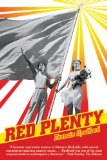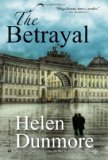Summary | Excerpt | Reading Guide | Reviews | Beyond the book | Read-Alikes | Genres & Themes | Author Bio

The historical context for The Secret Speech is a
presentation by Soviet Leader Nikita Khrushchev of a paper entitled The
Personality Cult and its Consequences, delivered to the 20th
Party Congress on February 24-25, 1956. The speech condemned Stalin, his
policies and the people who carried them out. It was called "The Secret Speech,"
because it was delivered behind closed doors and, in theory, no one outside the
room was to know of its contents (although it was widely – and probably deliberately –
leaked to the public). Smith's novel focuses on the wide-ranging consequences of
the speech.
Like its predecessor
Child 44, The Secret Speech
is top-notch historical fiction showcasing Smith's excellent grasp of 1950s Soviet politics. He is particularly good at illustrating the complexities
that pervaded the era; there is no black and white, decisions and actions are finely drawn in shades of gray. The reader will
unquestionably leave the book feeling they've gained a better understanding of
this chapter of Soviet history.
The protagonist of both books is Leo Demidov, a man as complicated as the
time period in which he lives. He has moments of bravery and
empathy, but also times when he's brutal and insensitive. Readers may feel a
certain sympathy for him, but its unlikely to develop into affection; he's simply not the all-too-common charming, infallible hero of popular
literature. The flip side, though, is that he is both unique and fascinating
precisely because his character doesn't fit neatly into a stereotype.
Although a sequel, The Secret Speech does stand on its
own reasonably well. It's likely, however, that readers would benefit from
spending time with Child 44 before tackling this novel. The earlier book provides
historical context that most will find helpful, as well as important information
about Demidov and his family that will put these characters in better
perspective.
While Child 44 fits squarely within the mystery genre,
The Secret Speech is more of a thriller. With plentiful gunplay, explosions,
torture, death, and general mayhem, it's so
action-packed that at times it seems like it could be a screenplay for next
summer's blockbuster movie; and Smith's ability to convey this type of
action on paper will have the reader barely able to turn the pages fast enough
to keep up.
However, it is not without flaws. One has the feeling that
the author has tried to cover too much territory in this single volume. He
addresses not only the Secret Speech and its impact, but prison ships, gulags,
the rise of the vory-v-zakone (see sidebar) and the Hungarian Revolution
of 1956. For example, the scenes taking place aboard the prison ship and in the
gulag are very exciting, but also shallow and ill-conceived; the reader
wonders why these sections were included as they add very little to the story.
In addition, some important characters are flat and lacking in credibility. The
biggest criticism that The Secret Speech is likely to contend with is that it's simply
not as strong a novel as the first book in the series. Nevertheless, those
who enjoyed Child 44 will mostly find their time well spent with The Secret
Speech, and will have the third volume in this planned trilogy to look forward to.
The Vory-v-zakone
Leo Demidov's prime antagonist throughout The Secret Speech
is the leader of a Russian criminal gang known as the vory.
The vory, or more officially the vory-v-zakone, is
a criminal organization that arose in the gulags during the Stalin years. Over
time this group has morphed into a powerful international organization referred
to as the Russian Mafia. (The 2007 movie
Eastern Promises, starring Viggo
Mortensen, concerns a modern-day vory cell in London.)
Vory-v-zakone translates as "Thieves in Law" – i.e., thieves who follow a
code. The organization of the 1930s to mid-1950s was based on a system of
discipline, tradition and rank which originated in the Soviet
labor camps in the 1920s. Any activity that suggested that the state had power
over the vory was forbidden. All proceeds had to be gained by theft
and members were forbidden from joining the army, paying taxes or working while
imprisoned. Sometimes prisoners known to be vory would be punished by the camp guards but as a general rule the camp authorities avoided direct confrontation with them. In addition to not serving in the military, vor were forbidden from having a family (although lovers were
permitted), and had to agree to never go to the police to redress a wrong, nor to testify in a criminal
case. They had to make good on promises given to other vor, teach the
trade to young beginners (maliutka), and have good command of the vory
jargon (fenia). They were never to attempt to redress a wrong committed
by another vor on their own. Women were considered as property and had no
place in the hierarchy of thieves.
The vory had no direct leader, although authority and
respect were given to senior vory, known as pakhany. The
skhodka was the organ of representation and control. Comprised of all
members of the local vory cell, the skhodka judged matters of
wrongs committed by one vor against another, or doled out punishment to
those who broke the code.
The original vory were virtually wiped out in the 1950s through fighting with
other groups and the ending of the gulags, but they never entirely died out, and
in the 1980s a new fraternity appeared which now has a leading role within the
Russian criminal hierarchy. Whereas the original vory were largely
contained in the gulags and regional groups, the modern-day vory have been able
to infiltrate top political and economic positions with an influence that
stretches well beyond Russia involving everything from petty-theft to billion
dollar money laundering. Since the 1990s, Britain has been a particularly
popular destination for Russians of many stripes to the point that it's capital
is sometimes referred to as Londongrad.
Continued in the sidebar ...
![]() This review was originally published in The BookBrowse Review in June 2009, and has been updated for the
May 2010 edition.
Click here to go to this issue.
This review was originally published in The BookBrowse Review in June 2009, and has been updated for the
May 2010 edition.
Click here to go to this issue.

If you liked The Secret Speech, try these:

by Francis Spufford
Published 2012
Red Plenty is history, it's fiction, it's as ambitious as Sputnik, as uncompromising as an Aeroflot flight attendant, and as different from what you were expecting as a glass of Soviet champagne.

by Helen Dunmore
Published 2011
A riveting and emotionally absorbing portrait of post-war Soviet Russia, a world of violence and terror, where the severest acts of betrayal can come from the most trusted allies.
Your guide toexceptional books
BookBrowse seeks out and recommends the best in contemporary fiction and nonfiction—books that not only engage and entertain but also deepen our understanding of ourselves and the world around us.